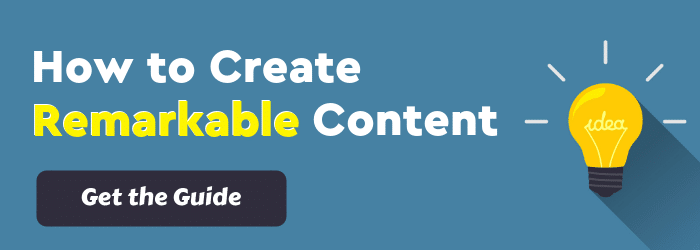
To write remarkable content, you need two things: a great writer and someone who knows the ins and outs of your industry. That catch is, it’s not often that you find one person who can fill both roles. So who do you choose to produce your content — the writer who has a way with words but no technical experience, or the technical expert whose writing is bland at best (or unreadable at worst)?
Fortunately, you have another choice: using your technical experts as subject matter experts (SMEs) to inform and guide your writers. For this option, you or a writer conducts an interview with an SME to get the details of the topic, then uses that information to write a well-informed piece of content.
But that often introduces another challenge: getting exactly the information you need from your SME (versus the information that they want to give you). While he or she probably has a wealth of information, it’s not always easy to get what you’re looking for.
To start, make sure you go into the interview prepared. While your SME may be a primary source of information, a basic understanding of the topic will help you ask intelligent, informed questions. Imagine going into an interview for a blog post on protecting your computer network from ransomware — when you don’t have a clue what ransomware is. You’d probably spend a good chunk of time talking about the very basics, without getting to the meat of the topic. If you’re already an expert on the topic, brush up on your interviewee’s background so you have an understanding of his or her specialties and take on the subject matter. If you’re new to the topic, make sure to come to the table with:
- A knowledge of key terms related to the topic, industry trends, or latest news
- An understanding of the topic at the appropriate level (sometimes high-level is appropriate, other times only a specialist will do)
- Insight into why the audience cares about this topic
- Several questions to jumpstart the conversation
While that initial research will help, it doesn’t guarantee a smooth interview. Here are some common challenges you or your writers may face and a few tips to help you through.
Challenge: Your SME is a talker
At first, it doesn’t seem like a problem: Your SME is eager to give you as much information as possible for your piece of content and monopolizes the interview, providing as much insight as possible. The con emerges when you get back to your desk — two hours later — and realize while you have a lot of stuff, it’s not actually what you need.
Tip: Ask the SME for an outline or a few bullets prior to the interview
Don’t go into an interview without something to guide your conversation — it’ll be far too easy to venture off course. To make sure your interview actually produces usable information, provide the specific topic to your SME and ask him or her to come to the table with a few bullet points that are crucial to the piece (or if you know the subject, present those points to the SME prior to the interview for review and comment). That way, you can spend the interview fleshing out those individual points rather than going off on lengthy (and unrelated) tangents — and you’ll come away with exactly what you need.
Challenge: Your SME is not a talker
On the other hand, you could get an SME who knows his or her stuff, but prefers to convey that information in curt, two-word responses. Which means that when you return to your desk — approximately five minutes later — you don’t have enough information to write a haiku, let alone a blog post.
Tip: Embrace the uncomfortable silence
Here’s where you employ one of the first interviewing tricks I ever learned: Embrace the silence. When an SME offers up an abrupt reply to one of your questions, don’t immediately jump in and say, “OK, great!” and move on to the next question. Embrace the silence. Let it get a little awkward. More often than not, the SME will eventually fill the void with more information — without you having to prompt him or her.
But if that’s not fruitful — and you just end up with a prolonged, really awkward silence — ask a follow-up question. Sometimes, all you need is a “Can you tell me more about that?” or “Can you give me an example of that?” and you’ll get your subject talking again. If at the end of the interview you still feel like the page might be empty, ask if you can follow up via email.
Challenge: Your SME tends to get stuck in the weeds
Sure, you want your SME to know the ins and outs of the industry, so he or she can explain it to you. But when your SME is totally entrenched in the subject matter on a daily basis, it’s not uncommon that your conversation may start to feel a little too technical (read: You don’t understand a word he or she says).
Tip: Ask the SME to explain it like you’re five years old
When you encounter a complex topic, ask the SME to explain the idea to you like you’re five years old. That will force the SME to approach the topic from a higher level, providing a much simpler picture of the core of the concept and help guide your follow-up questions.
You don’t have to (and shouldn’t) overlook all the technical details — since you do want to appeal to your audience, who’s familiar with the industry — but this will put you on a better path to understanding. And with a better grasp on the topic, you’ll be much better equipped to explain it to your readers.
Challenge: Your SME wants to do the writing
Maybe, when you ask your SME for an interview, he suggests that he take a stab at writing the draft for you — no interview required. While this could be a good thing (he does, after all, know the subject matter inside and out), it could also easily backfire if the draft comes back as a disorganized, incomprehensible mess.
Tip: Give it a shot
If the SME volunteers to write the draft himself, there’s a good chance he’s at least somewhat interested in writing, which tends to yield better results than someone who has no interest in it whatsoever. So, it generally doesn’t hurt to let your SME give it a shot and develop a first draft.
However, a few caveats to this: To minimize issues down the road, you should preface the assignment by laying out some expectations — such as an approximate word count, format suggestions (e.g., a blog post should have a few distinct sections with subheads, rather than one giant wall of text), and a disclaimer that you’ll edit the draft once it’s complete, but will allow the SME to review it a final time before it’s published. And, at least the first time you work with a particular SME (but it doesn’t hurt to make this a regular step in the process), it’s usually worth collaborating on an outline for the piece before he or she starts writing, so you can make sure you’re on the same page.
SMEs aren’t always easy to work with — but when that relationship is successful, they can help you write better, more relevant content for your audience.
Writing content is only a piece of your content marketing process. For help putting all the pieces of your content marketing plan together, download our eBook, “Build Your Content Marketing Plan: A 10-Step Guide.” Want help producing that content? Reach out.



